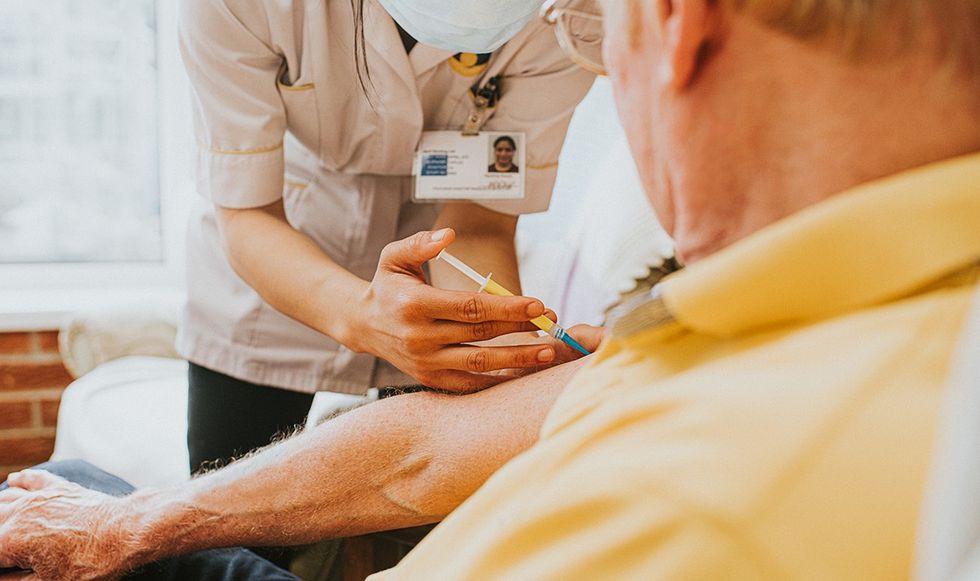New Covid variant sparking warning as cases soar - symptoms

Researchers are raising concerns about a recent mutation of the Covid virus that is causing a rise in hospital admissions throughout the UK just before summer.

KP.3 is part of a new category of COVID-19 mutations called FLiRT, which first appeared in early April.
The nickname that isn't official comes from the mutations in the genetic code of the variants.
They are a derivative of JN.1 - a version that has the potential to spread more easily with just one or two more genetic changes.
The latest data shows that infections in the UK have increased by almost 44 percent in just under two weeks.
According to data from the UK Health Security Agency, three different types of the latest FLiRT variation, known as KP.1.1, KP.3, and KP.2, were responsible for 40% of all cases in the UK by April 2024.
KP.2 was believed to be responsible for a surge in cases in May before P.3 took over, causing UK infections to nearly double to 44 percent in just under two weeks.
The percentage of KP.2's share has dropped to 22.
The number of people being admitted to hospitals increased by 24 percent in the week leading up to Sunday. This means there were 2.67 individuals per 100,000 admitted before, compared to 3.31 per 100,000 now, as reported by the UKHSA.
Decreased immunity in the overall population might be causing an increase in infection rates, but a leading scientist has cautioned that the rise of the newest variant serves as a warning that a surge in cases during the summer could be on the horizon.
"This is a reminder. The virus is still present and is not just a seasonal illness," Professor Lawrence Young, a scientist who studies viruses at Warwick University, explained to i.

The current count of confirmed cases is much lower than the highest point of the wave in the spring, which happened less than a month ago. It is also significantly lower than the very high levels we saw last fall and winter.
However, the most recent UKHSA data demonstrates that the percentage of positive test outcomes from individuals with suspected Covid increased by 19 percent within one week, climbing from 8.4 to 10 percent.
Vaccines are still our strongest weapon in protecting ourselves from serious illness and being hospitalized due to the flu and COVID-19.
In the same way, tests conducted at general practitioner clinics revealed an increase in positivity rates of 13 percent, rising from 4.7 percent to 5.3 percent during the same timeframe.
In a recent statement, Professor Steve Griffin from Leeds University mentioned that it appears a new wave of Covid may be developing, although it is still in the early stages.
The increasing number of people being admitted to hospitals is a concerning trend. Despite efforts to provide spring booster shots to high-risk individuals, the participation rate was not as high as last year. Additionally, the effectiveness of the current vaccines against the viruses currently in circulation is not as strong.
Comparable sounds are being detected on the other side of the pond as the mutation becomes more prevalent.
From the start of June, KP.3 has surpassed KP.2 and now makes up 25 percent of COVID-19 cases in the US. Its parent is close behind with 22.5 percent of cases.
How concerned should you be?
There is no proof that the newest version poses a bigger health worry to the overall public than its predecessors.
After many rounds of vaccinations and illnesses, most people have developed stronger immunity to fight off infections with less worry of getting severely ill.
If you are feeling unwell with symptoms of a respiratory infection like COVID-19 and you have a fever or do not feel up to going to work or doing regular activities, it is recommended by the UKHSA to stay away from vulnerable individuals and stay home if you can.
Vaccines are still our top protection against serious illness and the need for hospitalization due to the flu and COVID-19.
That is the reason why individuals aged over 75, those with a compromised immune system, and those residing in a care facility for elderly individuals, are encouraged to get their spring vaccination.
If you qualify, you can receive a spring COVID-19 vaccine through:









































